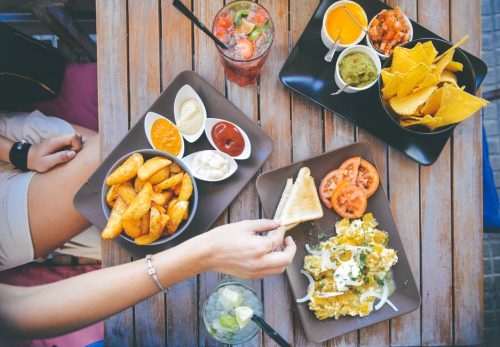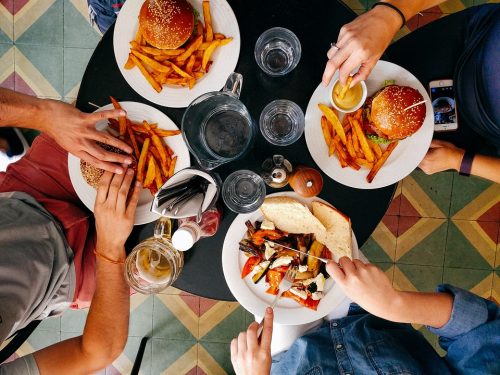Are food, sorrow, and distress related? We all agree that eating is nourishing to the body and soothing to the soul. It is said to make us feel better, especially when we are quite struggling mentally and emotionally. However, we do not know if it can really help when overcoming loss, breakup, or other depressing events in life. Let’s find out more about it here in this article.

“When something is ego-dystonic, this means that a person is experiencing thoughts, emotions, behaviors, or desires that are uncomfortable, unacceptable, distressing, and more precisely inconsistent with their self-concept,” says Elyssa Barbash Ph.D. Experiencing grief due to a broken heart is applicable to this. Continue reading to know the relationship between distress, food and grief.
Comfort Food – How It Can Help Alleviate Emotional Pain and Deep Sorrow
Usually, once the news of your breakup reaches your friends’ ears, they will hurriedly come to visit your home to try to support you during this time of loss, showing their care for your well-being and understanding the challenges of grief and loss. And of course, they will bring in meals with them in case you cannot afford yet to prepare one. They will even sometimes cook and do grocery shopping for you.
Yes, it is common for the community of people who are grieving to stay still, thinking, mourning, not wanting to move around, waste tears, and just lie down. You just can’t control your emotions. So making a meal is a bit of a struggle. Unhealthy eating habits become haywire, and it’s difficult to get a full meal in.
During the loss of a relationship, it’s challenging to eat even favorites like a simple fried chicken or trusty hard-boiled eggs or to even drink coffee. Food plays an important role in providing comfort during times of stress and anxiety. Seeking caregiver support from friends and family can also make a significant difference in coping with emotional challenges.
I used to love cooking for my boyfriend and it has been part of my ritual. However, when we broke up it was not just preparing meals that I find hard to do. I lose interest in creating my own dish, and even funeral potatoes don’t feel good anymore. Even my system is unable to connect and accept any kind of food recipes due to grief. I am also having a hard time preparing my favorite dish to eat with deceased love ones. It felt like my love for food just died.
It is as if my brain is telling my taste buds that all the food does not taste good. I can’t seem to find the appetite to eat whatever my friends are giving me. I don’t strive to eat anything, and I start to hate cooking.
(But, according to Deborah Serani PsyD, “A recent study in the journal of Psychological Science reports that turning to comfort foods can improve your mood.
As I speak with my experience, data from this research showed that consuming edibles that are associated with good thoughts and warm feelings not only support and improves a sense of well-being, they also decrease loneliness.”)
The Purpose Of Food During Grief

It Can Be An Act Of Love
I can’t find the strength to even look at the food due to despair. My suffering is eating me up. I cannot feel any craving for anything. I cannot even feed myself. But because love comes with the warm meals served in front of me, which my friends bring untiringly, I have to at least take a bite from the food.
The taste of love they have for me brings me back to the reality that I am single again, and accepting it can be hard, but I have to do something to survive and not drown in my sadness during this difficult time.
The fresh, flavorful taste of soup, sweet cookies and chocolates, and cheesy pizza find their way again into my life, giving energy for my physicality and soul to be alive again, a comforting reminder of the meals I shared with loved ones. Food has fixed my broken heart, the meal prepared by my friends and certain families who truly love and treasure me.

It Can Be A Girl’s Best Friend
While there are people like me who can’t seem to have the energy to eat, there are those who can’t think of anything but to eat as if food is the best friend they have during their days of grieving because of heartache. For them, it is the only one who understands what they are feeling.
As a broken-hearted girl eats, she pours out her emotions and cries her pain out loud. Almost losing her mind. Food is truly her comfort, consoling her soul through the grieving process.
It Can Be A Way For Diet Change
Try on a new diet. It can be a way for diet change, offering ways to give your mind a break from the loss of a loved one. Re-focusing your attention on planning new menus will somehow make you forget the pain. Why not plan on trying a vegetarian diet? Exploring dietary services grief might provide you with a sense of purpose during this challenging time. After dinner, you can hit the gym not just to clear your head but to look and feel better about yourself. Find ways to cope.
You can bring fruit and vegetables and mix them together. Don’t worry about too much science. Just focus on the enjoyment of preparing meals and feeding yourself to your desire.

Sadness & Loneliness
Nighttime brings much sadness and reminds you that you are hurting. By inviting friends or family over and preparing a meal for them, you’re doing yourself a favor, as their company can help ease your sadness. They can keep you company, and you can talk about something else rather than thinking of your loss.
Being busy taking care of your guests or washing the dishes will exhaust you and help you fall asleep easier.
Most people deal with their heartaches in an unhealthy way. Food is a much better way to indulge yourself in. You can even buy your comfort food from your favorite restaurant. If you can’t eat full meals, you can pick certain food that is to your taste. For example, if you miss bread, just toast some and maybe spread sour cream on it.
It can also help you meet the creative stranger in you. Discovering that new you who is good and happier in the kitchen can make you feel better and boosts your confidence. You may not realize it, but you are already making it through the heartache and unwanted memories and are ready to reveal a better version of yourself. Your mission is to focus on joy with your friends and family and not on the bereavement of a failed relationship.
If you find it hard to get over the despair caused by a relationship breakup or the death of a loved one, consider trying bereavement services such as grief counseling to help you cope. These services often include support groups where you can share your feelings and find solace in others who have experienced similar losses. “If you think your self-esteem is shattered, work with a therapist to build it back up. It’s never too late to feel good about yourself,” Margarita Tartakovsky, M.S., stated.
Get over the pain, unload the burden, and be more confident in yourself because everybody deserves better than the pain you went through.
Frequently Asked Questions (FAQs)
What should you eat when grieving?
When grieving, it’s important to focus on nourishing foods that provide comfort and support during times of stress and anxiety. Comfort foods like soups, stews, and easy-to-digest meals can be helpful. Incorporating fruits, vegetables, and whole grains can also provide essential nutrients to your body. It’s essential to maintain a balanced diet even when grieving.
Do people eat more when grieving?
People’s eating habits can vary when grieving. Some individuals may find solace in food and eat more, while others may experience a loss of appetite. Emotional eating can be a coping mechanism for some, leading to increased food consumption during times of grief.
Why does grief make you not eat?
Grief can affect your appetite due to the emotional and psychological stress it places on your body. The intense emotions and feelings of sadness, loss, and anxiety can suppress your appetite and make it challenging to eat. Additionally, grief can impact your digestive system, leading to physical symptoms like nausea and a loss of interest in food.
Can all the stages of grief make it hard to eat?
Yes, all the stages of grief, including denial, anger, bargaining, depression, and acceptance, can make it hard to eat. Each stage can bring its own emotional challenges that may affect your appetite and eating habits. Seeking support, including caregiver support and services grief, can be essential during these difficult times.
What is the hardest stage of grief?
The experience of grief is highly individual, and what may be the hardest stage can vary from person to person. Some individuals find the stage of acceptance the most challenging, as it involves coming to terms with the reality of the loss. Others may struggle more with the intense emotions of anger or depression. Grief counseling and services grief can provide valuable assistance during any stage.
Does grief make you gain weight?
Grief can impact weight in different ways. Some people may experience weight loss due to a loss of appetite and the physical toll of grief. Others may turn to emotional eating as a coping mechanism, leading to weight gain. The impact on weight can vary greatly depending on the individual and their eating habits during grief.
What does grief do to your body?
Grief can have various physical effects on the body. It can lead to symptoms such as fatigue, headaches, sleep disturbances, digestive issues, and changes in appetite. The body’s stress response during grief can also affect the immune system and increase the risk of illness. Seeking caregiver support and services grief can help manage these physical effects.
How long does intense grief last?
The duration of intense grief varies from person to person. It can last for weeks, months, or even years, depending on the individual and the nature of the loss. Grief counseling and services grief can help individuals navigate this challenging period and find ways to cope.
What happens to your brain when you grieve?
Grief can affect the brain’s chemistry and functioning. It can lead to changes in neurotransmitters and hormones, contributing to feelings of sadness and anxiety. The brain’s stress response is activated during grief, which can result in cognitive changes, such as difficulty concentrating and making decisions. Seeking professional support during grief can be crucial for managing these neurological effects.
Why is grieving so hard?
Grieving can be exceptionally challenging because it involves coping with complex and intense emotions. It requires individuals to process the loss of a loved one or a significant life change, which can be emotionally overwhelming. Additionally, the physical and psychological toll of grief can make it a difficult journey. Seeking caregiver support and services grief can provide valuable assistance in navigating these challenges.
